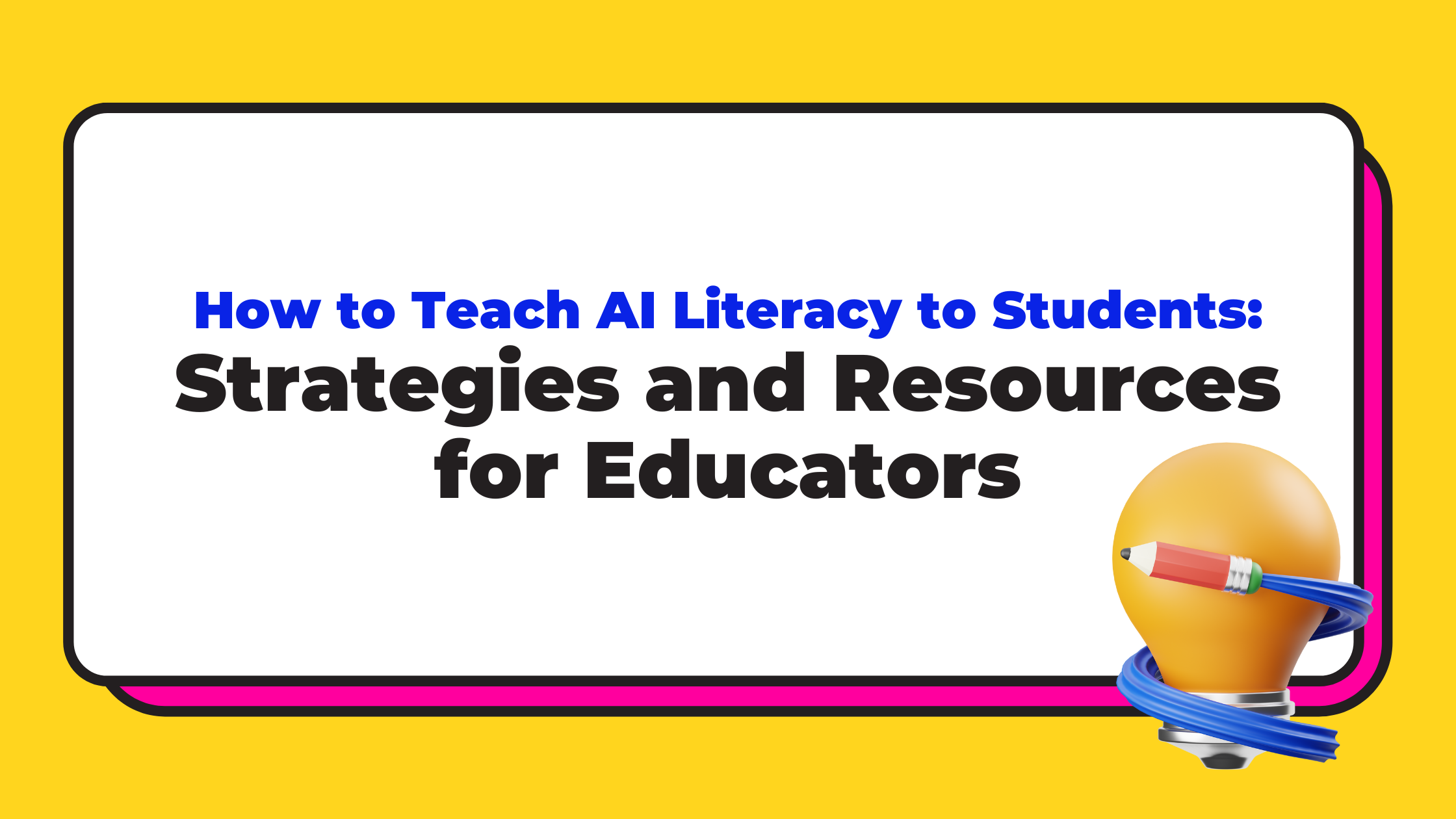In today's digital era, understanding artificial intelligence (AI) is becoming increasingly important for students. AI literacy equips them with the knowledge and skills to navigate the AI-driven world effectively. As an educator, you play a crucial role in teaching AI literacy to your students. In this blog post, we will explore effective strategies and valuable resources that can help you impart AI literacy to your students and prepare them for the future.
1. Start with the Basics: Introducing AI Concepts
- Explaining what AI is and its applications in everyday life
- Differentiating between narrow AI and general AI
- Highlighting the benefits and challenges of AI technology
2. Foster Critical Thinking and Ethical Considerations
- Encouraging students to think critically about AI's impact on society
Discussing ethical concerns, such as bias and privacy, in AI development and usage
Promoting responsible AI practices and addressing potential risks
3. Hands-on Activities: Exploring AI Tools and Technologies
- Introducing students to AI-powered applications and tools in the classroom, such as chatbots and AI tutors.
- Allowing students to experiment with AI technologies through projects or simulations
- Encouraging them to analyse and evaluate the outcomes of AI systems
4. Collaborative Learning: Group Discussions and Debates
- Organising class discussions on AI-related topics and current events
- Facilitating debates on controversial AI issues to foster critical thinking and diverse perspectives
- Encouraging students to present their research and opinions on AI topics
5. Incorporate Interdisciplinary Approaches
- Connecting AI literacy with other subjects, such as ethics, computer science, business studies or social studies
- Collaborating with other teachers to integrate AI-related content into various disciplines
- Exploring real-world examples of AI applications in different fields
6. Engage with AI Professionals and Experts
- Inviting guest speakers, AI researchers, or industry professionals to share their expertise
- Organising field trips or virtual sessions to AI-related organisations or labs
- Facilitating Q&A sessions or panel discussions with AI experts
7. Utilise Online Resources and Tools
- Recommending reliable websites, videos, and online courses for AI education
- Providing access to AI programming platforms or educational tools
- Curating a list of AI-related books, articles, and podcasts for further exploration
8. Promote Creativity and Innovation
- Encouraging students to brainstorm AI applications that can solve real-world problems
- Guiding them in designing AI-based projects or prototypes
- Celebrating and showcasing student innovations and ideas in AI
9. Stay Updated: Continuous Learning for Educators
- Engaging in professional development opportunities focused on AI literacy
- Joining online communities or attending conferences to stay abreast of AI advancements
- Networking with other educators interested in AI education
10. Assessing AI Literacy Skills
- Developing assessments that evaluate students' understanding of AI concepts and their implications
- Incorporating AI-related projects, presentations, or portfolios in grading criteria
- Providing constructive feedback to students to further develop their AI literacy skills
Resources for Educators
Lesson Plans and Teaching Materials
-
AI4K12: An initiative by the Computer Science Teachers Association (CSTA) and the Association for the Advancement of Artificial Intelligence (AAAI), AI4K12 provides resources, lesson plans, and guidelines for teaching AI in K-12 education. AI4K12.org
-
Google's AIY Projects: Google offers a range of AIY (AI + DIY) projects that allow students to build AI-powered applications using simple, easy-to-follow instructions. AIY Projects
-
IBM AI Education: IBM provides a comprehensive set of resources, including lesson plans, activities, and videos, to help educators introduce AI concepts to students. IBM AI Education
Professional Development Opportunities
-
AI4ALL: AI4ALL offers professional development programs for educators to learn about AI and its applications in education. They also provide resources and support for incorporating AI into the classroom. AI4ALL.org
-
ISTE AI in Education Professional Learning Network: The International Society for Technology in Education (ISTE) offers a professional learning network focused on AI in education, providing resources, webinars, and networking opportunities for educators. ISTE AI in Education
- Noodle Factory Workshops and Webinars: Discover the exciting world of chat-based learning and cutting-edge developments in generative AI by joining our upcoming events and webinars. Our next in-person event, Teachers Meet Tech, will take place on May 23rd, 2023 in Singapore, and is open to all educators interested in exploring chat-based learning. Participants will leave with a fully functional chatbot to engage students immediately. Don't miss out, sign up here to learn more!
Conclusion
Teaching AI literacy to students is a vital endeavour in preparing them for a technology-driven future. By implementing these strategies and utilising valuable resources, educators can empower their students to become informed users and ethical decision-makers in the world of artificial intelligence. Together, let's equip the next generation with the knowledge and skills needed to thrive in an AI-powered world.
